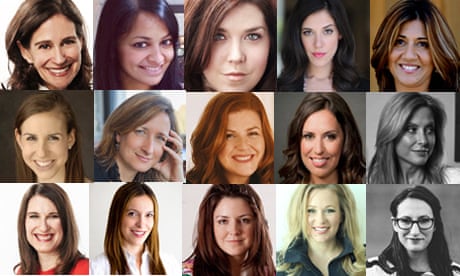Now that Lean In has hit stores, women and men are sounding off about Sheryl Sandberg's advice. But we wanted to know what women who can relate to Sandberg's professional context (ie, those who work in tech and media) think of her message. Do they share her point of view? Do they find her advice useful? Do they see it having a lasting impact? Are there other challenges that she left unaddressed?
We approached a community of women, members of a "platform for awesome women" called The Li.st, to find out. These women are all at different stages in their careers – some are just starting out, others are executives, a few have branched out and started their own companies. We asked them whether they have any use for Sandberg's advice and what, if anything, they think it will do for the women's movement as a whole.
Navitate the reviews using the links below or scroll down to read them all.
Navigate the reviews:
Will Sheryl Sandberg's advice useful to you?
Women in their 20s
Women in their 30s
Women in their 40s
Women in their 50s
How do you think Lean In will impact the women's movement?
Women in their 20s
Women in their 30s
Women in their 40s
Women in their 50s
Is Sheryl Sandberg's advice useful to you?
Christina Wallace, Director, Startup Institute of New York

Sheryl's advice was extremely relevant at this stage in my career. I'm nearly 30, with an MBA and a decent amount of experience under my belt, and I'm reaching a point that I might naturally pull back a bit. I have a full-time job, several consulting and freelance gigs, a substantial role in my professional community, and two volunteer board seats for nonprofits I support. I'm busy, and I like it that way.
But I've also had the conversation with friends that, while I'm single and don't technically have demands from a partner or children yet, is this pace sustainable once that happens? And if not, does it make sense to keep it going right now? Sheryl's comment about making sure you keep leaning in so you have something you're passionate about returning to was so important to hear.
There's a big stretch role I've been eyeing for next year, which will involve a geographic relocation and a set of substantial changes for my social life, and I've been wondering if it's worth disrupting everything for such a big leap (and if I'm even qualified to vie for it in the first place). But I know I have to do it. It's my turn to lean in.
Callie Schweitzer, Director of Marketing and Communications, Vox media

There's one line in Lean In about office culture that really resonated with me as a young professional in the media business: 'Instead of putting on some kind of fake 'all-work persona,' I think we benefit from expressing our truth, talking about personal situations and acknowledging that professional decisions are often emotionally driven.'
My best ideas are influenced by personal experiences that come from both my work and personal lives. In the age of social media, there's such a blur between work and personal, and I think companies really benefit from knowing who their employees are as people, not just as workers. When I read this line, it reminded me to really seek out more of my coworkers and find out about their incredibly vibrant lives outside of work and see what unique ideas we can come up with by merging our "non-work" personas.
Nisha Chittal, Social media strategist, Travel Channel

As someone in a crucial early stage of my career, I've found Sheryl's advice incredibly useful. Whether it's something as simple as speaking up in more meetings or coming up with an idea for a new project or campaign, "lean in" has become a daily mantra to me in my work and activities outside of work as well. I want a "lean in" poster that I can hang on my office wall for a daily reminder!
Morra Aarons-Mele, Founder, Women Online

I am having a hard time with this whole debate, and even though I have been a blogger on women and work for eight years, I'm just stepping out of this circle. I have huge respect for Sheryl Sandberg and for Marissa Mayer, for that matter. I have the highest respect for Anne Marie Slaughter and those who promote systemic change in our work system. But I'm sick of feeling bad about women, sick of feeling bad about my own decision to "lean out" and embrace a less traditionally "successful" business role, and really sick of the attacks online. I don't mean to sound sanctimonious here. I thought when Sandberg's book came out I'd be its biggest cheerleader. But for some reason, I get a depressed feeling in my gut when I even see the term "lean in." Am I alone here? Is this the real power of the book, in that it hits so close to home? Is this how people felt back when they first read The Feminine Mystique?
Because honestly, the book and the discussion is making me want to put my head down and just focus on my small business, my work. And maybe that is the very definition of leaning in. The whole thing is very confusing!
Sloane Davidson, VP Marketing and Communications, Lippe Taylor

I graduated college in 2001, which makes me Generation Y. I feel a huge gap between women my age and those 5-10 years younger. I didn't automatically grow up with technology but I was an early adopter and have leveraged my passion for what's new and next into a career in digital marketing and social media. The challenges I face are that I'm in a young industry and both mentors and sponsors are hard to find. I agree with Sheryl's lean in advice around setting career goals (18 months and life-long) and also how to work with peers and those in more senior positions.
Amanda Steinberg, CEO, Dailyworth.com

I was raised by a single mom who encouraged me never to depend on a man for financial security. So in my 20s, I pursued the lucrative career of computer programming. By age 30, I was earning $200k annually, but had built such an expensive lifestyle that I hadn't saved any money. I started my website DailyWorth because I was raised to live Sheryl's message, and I realized that women can't be truly powerful or independent until we understand how to save and manage money.
I spent last weekend reading Lean In, lying on the sofa chanting and shouting passages from the book. Like Sheryl, I'm a mother to two young children, and living my ambition as CEO of a venture-capital backed media business. For most of my career as a young mother and ambitious entrepreneur, I wasn't able to name any role models. Until Sheryl Sandberg.
Ruthie Ackerman, Senior Program Manager, Tory Burch Foundation

I'm mid-career and I have found Sheryl's advice illuminating and very useful for where I am in my career right now. A few years ago, I was at a turning point in my career as a journalist: I was ambitious and wanted to lead and yet I didn't see the opportunity to do so. I was hoping to be noticed for my work and yet I didn't think it was happening fast enough. I looked at my editors and those in positions above me and knew I didn't want their jobs. One year ago I took a risk and switched careers from journalism to philanthropy. I had written about philanthropy, but had never worked in a foundation before. I wasn't sure I had the skills or would even enjoy the work. One year later I can say it was the best decision of my life – I learned so much and really feel like I have found my career path. And now I am about to start a fantastic new position at the Tory Burch Foundation.
Sheryl said something in Lean In that opened my eyes: Don't wait for power to be offered to you. You have to go after it. She explains that waiting for a boss to acknowledge your hard work and give you a promotion is the career version of waiting for Prince Charming. "Whoa," I thought, when I read that. I had been waiting for the white horse to whisk me away. Like so many women, I was nervous about taking risks in my career. I was scared of new challenges, worried I wouldn't have all the skills necessary to succeed in my job. The truth is I did have what it took to work in the foundation world: intense curiosity, a strong work ethic and a desire to learn. No white horses ever came to carry me down any career paths. But by acknowledging to myself that I was ambitious and wanted to lead, it helped me realize where I needed to be to make that happen.
Tereza Nemessanyi, Startup advisor, Microsoft

I have been "leaning in" for years – and yet the struggle has gotten harder – not less – on how to continue to deploy my brain, education and experience. The problem is, despite a family schedule which is detailed down to the minute, the best-laid plans go awry. Seemingly every week.
Bottom line: parents – moms and dads – need flexibility. And yet jobs offering flexibility and good pay and interesting work are exceedingly rare, and we are not even trying to create them. (Generally, in larger corporations, these types of jobs are internal transfers and never hit the outside market.)
In the last few downturns, middle management has been eviscerated. This has had deleterious effects – we have not trained the next generation of managers (or senior management) in how to manage a flexible, diverse workforce where "facetime" is not the goal. These require maturity and creativity and foresight.
The core Lean In message works for younger women. But for smart mid-life women and families, a wholesale re-framing of work and innovation is what's needed.
Nilofer Merchant, Corporate Director, Governance

As an executive who has gone from being an administrative admin, a Fortune 500 corporate executive, to CEO of a multi-million dollar firm, and now a corporate director, I see Lean In as a key way to raise awareness of how gender bias works and how incredibly prevalent it is. When I talk with companies about Board roles, men often say that the problem will take care of itself when there are more qualified candidates. But this view often hides a circular argument. How will we know when more women are qualified? When more women hold those roles! Or when those men know of more women who can hold the role. This logic might work if one could magically ensure that gender selection bias does not exist. But there is ample evidence for precisely the opposite, as Lean in documents. Gender bias exists, and both men and women are affected by it (yes, you read that right, even women can be sexist!). We are not talking about equality of outcomes here; the results show bias thwarts equality of opportunity. As long as women are not seen, they cannot even contribute so I'm hoping that this book improves the filters that leave women out.
Kara Goldin, CEO and Founder, Hint Water

Like Sheryl Sandberg, I faced numerous challenges in the corporate world and realized I needed to follow my passions. "Leaning in" has been a part of my world for as long as I can remember; and within the past nine years, I was able to turn Hint, which started as my home improvement project, into a multi-million dollar company by staying true to what I believe in. I took an issue that I am passionate about and created a product that not only benefits me and my family but all of my loyal customers who are looking to lead healthier lifestyles as well. This core philosophy started with me and now translates to my entire company.
Susan McPherson, Senior Vice President, Fenton

Over the trajectory of my career, I have faced many of the issues that Sandberg eloquently presented. From having dealt with a traumatic sexual advance from a senior staffer during a senatorial internship in Washington, to the temptation of an extramarital affair with a boss, when I was traveling thousands of miles a year, to negotiating for salary increases and promotions, much of her advice/guidance rang true.
I especially could relate to her sharing that there are days she still feels like a fraud. It felt almost cathartic to know that such an accomplished woman has insecurities of her own. Personally, I'm pleased that Sandberg wrote the book and has taken on this issue, especially for women in the early starts to their careers. The specifics around making a plan and accepting less than perfection should be required learning. I only wish I had had such guidance as I lost my mom at age 20 and didn't have a role model or mentor to turn to.
Kathleen Warner, Chief Operating Officer, Startup America

As a C-suite woman, who has spent over 20 years in law, investment banking and public service, much of Sheryl Sandberg's advice resonated with me, both as validation for what I've been thinking, feeling and doing over the course of my career and as inspiration and guide for my path in the years ahead. Right now, I'm at yet another inflection point, where it would certainly be easier and more comfortable to accept the mostly well-meaning guidance of others of what I "should" be doing. But I'm not only dreaming the possible dream, I'm working to make it a reality, by reaching outside my comfort zone to lean in, rather than away, from opportunity and yes, risk. For me, it's not only about my choices, but also, about leading by example, for other women and girls, to dream and live their dreams.
Whitney Johnson, Co-founder Rose Park Advisors

Though I am the co-founder of investment firm Rose Park Advisors with Clay Christensen, and began my career in 1989 as a secretary (think Melanie Griffith in Working Girl), I winced in remembered pain as I read Sandberg's book. There was the M&A banking slot I desperately wanted, but was told no because I was pregnant, the boss who wouldn't remunerate me for superior client service because "girls like to do that sort of thing." And the occasions, not a few, when I have watched senior men throw open the door of opportunity for young men – doors that I had hoped (and asked) to be opened for me – and was then expected to wave my pom-poms as the young Turks paraded by. Thus, reading Sandberg's book was just a little painful, but I felt validated. It wasn't (and isn't) just me. Reading her book has both given me courage to keep leaning in to my career, but also been a reminder to lean in to my life.
Where does the women's movement go from here?
Christina Wallace, Director, Startup Institute of New York

I do think the women's movement is stalled – especially since it's just not something my generation really thinks about. Except on Equal Pay Day and a few other token days throughout the year we've neglected the ongoing conversation. But nothing stays still: if we're not moving forward, we're falling backward. Just look at the comments made in the 2012 election around women's health, safety, and reproductive rights. If we aren't in leadership roles in business, education, and government, our voices and our interests won't be represented.
What Sheryl has done with this book is jumpstart the dialogue with a revised definition of a "feminist". Gone is the perception of a vitriolic bra-burning man-eater and instead we are left with anyone who believes women and men can and should be treated equally. She's also called attention to the fact that time alone is not going to fix these issues. It's no longer a matter of waiting for a generation to flow through the pipeline, it's a matter of fixing the process (and plugging the leaks in the pipeline along the way).
Callie Schweitzer, Director of Marketing and Communications, Vox media

The most important message I took from Lean In and how Sheryl described the women's movement was that it's not up to any one individual to change things for women, it's up to all of us. This fight is something we – men and women – all need to work toward every day. It's not about a single lightning bolt or moment in time, it's about a new level of awareness that informs all of our actions and decision-making and makes us more conscious of the challenges we face and how to overcome them.
Nisha Chittal, Social media strategist, Travel channel

I do think the women's movement has stalled. I absolutely agree that leaning in alone isn't the complete solution – we do need structural changes in our workplaces that make workplaces more flexible and family-friendly. But, we also need more women to push forward, lean in and aim for leadership roles. A combination of both of those solutions – more women aiming for the top AND structural changes – will help us truly reach equality for women at work.
Leslie Bradshaw, Chief Operating Officer, Guide

As I see it, the movement needs to (and can) go in three key directions from here.
First, it brings in men to not only serve as bridges into power and true 50/50 partners, but it opens up opportunities for them to express a full spectrum of their lives beyond being the sole breadwinner (eg, stay at home dads, part-time employees, equal contributor to childcare, etc.).
Second, it touches so many levels of women in the workforce (and men too), that the groundswell catalyzes movement from policy makers in the public and private sectors. The hope is that these policy makers (national, state, local and company) help re-envision their workdays and work structures to help women better on and off ramp.
Third, it becomes an international movement. Especially in countries that are sorely lagging in women's rights. I helped produce this video with the Economist in 2011 and there are so many countries that still need to bring their cultural midsets, policy, and practices up to par. My hope is that the US leads the way.
Brooke Moreland, Cofounder and CEO, Fashism

I was 10 pages into Lean In, when I put it down and exclaimed to my 25-year-old sister: 'Oh my God, you have to read this book. It's so spot on and so important!' After giving her a brief summary, she explained that she had no interest in reading it. According to her, women in the developed world have achieved parity with men, and it was the rights of men that we need to be concerned with now. So yes, I think the movement has stalled. Can we please make Lean In required reading?
Jessica Bennett, Executive Editor, Tumblr

For me, the novelty of Lean In is that it put words to what I believe many women of my generation struggle with: that paralyzing sense of self-doubt, that insecurity, that fear of being perceived as too harsh (or, god forbid, bitchy) that causes us to keep our hands down instead of raising them (or, as Sandberg puts it, to 'lean back when we should be Leaning In'). Ask any woman in her 20s or 30s – I guarantee you, she's felt it. Many of the women in my generation don't even identify as feminists. And yet here comes Sheryl Sandberg, talking about the barriers we can control. The timidness I so often face when speaking in front of a crowd; the fear of asking for money that so often affects my female colleagues; the lack of mentors; the fact that we feel like frauds when we sit at the executives' table, surrounded by men. This is the first book of its kind, with practical, pragmatic advice. I think many of us are using it already.
Jo Piazza, Senior Digital Editor, Current TV

When we start thinking about whether Sheryl is restarting the women's movement I think it is interesting to note her word choice. She doesn't use movement as much as she uses revolution to describe what she is trying to do.
A revolution is a forcible overthrow of an existing order, whereas a movement is a group of people with a common ideology getting together to achieve a goal. A revolution is by definition more violent and more active and I would argue, distinctly more male. The word choice was no accident. Lean In is a great start. Revolutions need tinder, a spark, attention and engagement. This book provides the spark and now it is up to the rest of us to provide the attention and engagement.
Jocelyn Leavitt, CEO and CoFounder, Hopscotch

I'm a true believer in Sandberg's message. There's no question that the women's movement has stalled – as the numbers of women graduating from colleges and graduate schools have continued to reach parity, women are still underrepresented in leadership across nearly every industry. I feel a deep gratitude for Sandberg's courage in sticking her neck out to talk about these issues when she could quietly bask in her own exceptionalism, out of controversy's way. As she says, writing this book was her own way of leaning in and doing the thing she would do "if [she] weren't afraid."
My hope is that Sandberg's message infiltrates dinner party conversations across the country. Much of what she says relies on changing prevailing attitudes and how men and women relate to each other. Ie: male mentors' discomfort with female mentees, men acknowledging their desire for more time with their families, men becoming more comfortable with their wives being the primary breadwinner. I wish Sandberg had more visibility and name-recognition nationally, but if we acknowledge the deceleration of the women's movement and begin talking about it around the dinner table, we can make a modern feminist movement that involves men as well as women.
Christina Vuleta, Founder 40:20 Vision

I think the reaction to the book says more about the state of feminism than anything else. We're all caught up in judgment. For all the women who say they are not a feminist I think – really, you don't believe in equal pay and equal say? It's feminism's image (eg man haters, humorless, harsh) that women resist associating with today.
I hope the Lean In discussions ultimately promote a realization that it's time to enter a judgment-free zone. Having interviewed hundreds of women about "what they know now", I still hear a lot of judgment about how we work and raise families … but it's less about other women's choices than it is validating our own. We have tons of choices and managing work and life, regardless of whether it's in the office or home, is not easy.
Let's give each other freedom to make those choices without fear of judgment. Then we could listen to Sandberg's advice to women (and decide if it is right for us) rather than judge her choices as a woman. I do think there is power in Sandberg championing a perspective and bringing awareness back to the true meaning of the feminist movement.
Tereza Nemessanyi, Startup advisor, Microsoft

Ms Sandberg is totally correct – the women's movement is stalled. We see it in all the numbers: investments, boards, senior leadership, wealth creation and wages. We are educating more women than ever, but we are not keeping up in earning and we are not getting to the higher levels. In key fields such as science and technology, we are going backward.
In the 1970's when I was growing up, girls like me watched public service announcements blaring that everything was possible. We believed it. And so we did not continue to push it forward, as it seemed the battle had already been won.
When I look at my two daughters, and I look at the numbers, I see the numbers are at best equivalent to when I was there age – and in some cases worse. My big takeaway is, if we don't push and push, we don't stay neutral – we move backwards. So for our daughters, and their daughters, we have to do it.
And no great movement every happened in isolation. Today we have enlightened men – brothers of sister, fathers of daughters – who see it too. We must be expansive and inclusive. If we don't, the inertia will slide us back to single digits.
Nilofer Merchant, Corporate Director, Governance

As Sandberg's own career attests, the movement isn't stalled. That's just plain hooey.
Women do have more choices. Between entrepreneurship and the ability to do work as freed from jobs, nearly 50% of the US economy is already flexible in how they manage their careers and their lives. Many workplaces have policies that support both men and women to have more flexibility, and the next generation of young men (like my son-in-law) are loving their own more active role as co-parents and, well, co-everything.
The power of Lean In is that it accelerates change, so we can make gender equity a reality in the next 20 years, not the next 60. At the current statistics of 16% of board seats are held by women (and only 3% when you look at color) it's time for faster progress.
Susan McPherson, Senior Vice President, Fenton

Honestly, I don't believe a book or an accomplished leader (even Sandberg) can truly grow a movement from the top down. Yes, she can be the catalyst (which she is truly leading), but in order for Lean In to truly take off, we need men of all ages, incomes and career-paths to embrace and push for systemic change.
Kathleen Warner, Chief Operating Officer, Startup America

I think the movement needs a makeover. My 24-year-old daughter – brilliant, ambitious and amazing – crinkles her nose at the words "feminist" and "women's movement". In many ways, the most powerful thing about Lean In is that someone in Sheryl's position stood up and called herself a feminist and put herself out there in a really personal way.
I greatly admire and emulate that courage. So I don't think it's a lightning bolt, but rather, having a new leader that provides a permission structure and cover for others to stand up and do the same: men and women. I do think its absolutely key, as I believe Sheryl says, for the institutions to change and for men to be part of the solution.
Whitney Johnson, Co-founder Rose Park Advisors

The women's movement has hit a glass ceiling. Among the ranks of mid-level management, there are now women aplenty, but in the highest echelons of business and politics, there are few to be found.
As a society (women and men), we've been in denial, wanting to believe these ceilings and walls were permeable, and Sandberg's book is a resounding call to re-examine the reality of why so few women make it to the top. Even as she affords women the opportunity to collectively voice our grief over the loss of work opportunities we thought would be ours, the pages of empirical data she includes in her book also further mount pressure on business and government to stop lounging and leaning back, and to instead lean in to women, and celebrate and remunerate us for what we bring to society.
That Sandberg has done this from her powerful perch makes it almost impossible to ignore. As women embrace her message, and the conversation around women, work and power takes center stage, watch out – the ceilings and walls just might come crashing down.

